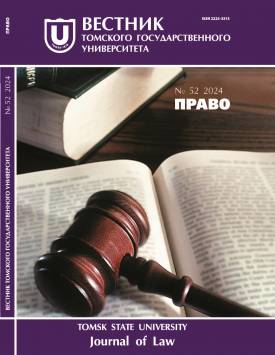On the issue of classification of investigative groups on the basis of a comparative analysis of the criminal procedural legislation of the Russian Federation and the USA
The authors in the content of the article carries out a comparative legal analysis of the criminal procedural and departmental legislation of the Russian Federation and the United States of America regulating the processes of organization and activity of investigative groups formed in the system of law enforcement and investigative bodies of these states. It is noted that the criminal procedure legislation of the United States, due to the peculiarities of the Anglo-Saxon system of law, has many differences in the field of regulatory regulation of criminal proceedings, especially pre-trial stages. The author defines the preliminary investigation bodies of the Russian Federation and the investigative bodies of the United States, whose structure provides for the possibility of organizing and operating investigative groups. Thus, it is determined that these bodies in Russia, in accordance with the criminal procedure legislation of the Russian Federation, include investigative bodies of the Investigative Committee of the Russian Federation, as well as investigative units of internal affairs bodies. In the law enforcement and law enforcement practice of the United States, the investigative bodies include, in accordance with national legislation, the police, as well as the Federal Bureau of Investigation, while it is established that the form of investigation is an inquiry carried out by the judicial authorities authorized to investigate crimes. In the substantive part of the presented article, the author analyzes the provisions on the classification of investigative groups of investigative bodies of the Russian Federation and the United States, that is, on the types of investigative groups provided, the grounds for their division into types depending on the grounds defined by legislation. Thus, it is determined that investigative groups of Russian investigative bodies can be formed in the divisions of the relevant investigative bodies on the grounds provided for in Part 1 of art. 163 of the Criminal Procedure Code of the Russian Federation, at the same time, similar grounds for the creation and assignment of an investigation to an investigation team are also enshrined in American criminal procedure legislation. As a rule, such grounds are the complexity of the criminal case (meaning the complexity in the process of investigation, collecting evidence, evidentiary information and attaching them to the criminal case), as well as a large amount of procedural and (or) other work on the criminal case. Another similar aspect in the context of comparative legal analysis of investigative groups of law enforcement agencies of the Russian Federation and the United States is the possibility of organizing investigative and operational and interdepartmental groups. However, according to US law, the organization of investigative and operational groups is directly provided for by the norms of departmental legislation, and according to the legislation of the Russian Federation, the possibility of organizing investigative and operational groups (as well as interdepartmental ones), unfortunately, is not provided, as a result of which the procedural registration of the creation of such groups is reflected exclusively in the acts of the bodies of inquiry. In conclusion, the author also analyzes the features of the creation of investigative groups of US law enforcement agencies associated with the wide differentiation of investigative groups depending on the activities carried out: the investigation of certain types and categories of crimes; the formation, accumulation, systematization and improvement of law enforcement practices related to the activities of investigative groups to investigate crimes; the permanent nature of the activities of various investigative teams, which determines to a certain extent their effectiveness. The author declares no conflicts of interests.
Keywords
investigative group, investigative and operational group, classification of investigative groups, preliminary investigation, law enforcement agencies, criminal procedure legislation, criminal proceedings, comparative legal analysisAuthors
| Name | Organization | |
| Smirnova Irina G. | O.E. Kutafin Moscow State Law University; Tomsk State University | smirnova-ig@mail.ru |
| Lubyagin Mikhail S. | Baikal State University | lubyaginmichael@mail.ru |
References

On the issue of classification of investigative groups on the basis of a comparative analysis of the criminal procedural legislation of the Russian Federation and the USA | Tomsk State University Journal of Law. 2024. № 52. DOI: 10.17223/22253513/52/4
